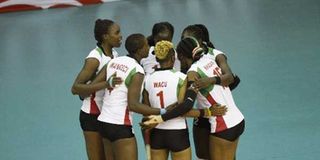Premium
Solid youth programmes needed to restore Kenya’s spark in women’s volleyball

The Kenya women volleyball players celebrate a point against Tunisia in a Federation of International Volleyball World Cup qualifiers match at Safaricom Stadium Kasarani on February 22, 2014.
Numbers don’t lie.
Thrice, Egypt’s women’s team has beaten Kenya this year and last week the trend continued at club level during the African Club Championship in Cairo, Egypt.
Al Ahly and Zamalek renewed their rivalry in the final of the continental event with the latter emerging 3-2 winners to successfully defend their African title. Enroute the semi-final, the two Egyptian clubs beat Kenyan teams in the semi-finals with Zamalek defeating KCB 3-1 while Al Ahly overcame Kenya Pipeline 3-1.
The recently concluded African Club Championship was the latest platform for the Egyptian ladies to continue their renaissance in women’s volleyball. Boosted by the presence of professional players Tatjana Bokan (Al Ahly, Montenegro) and Milca Lubieska da Silva (Zamalek, Brazil), Egypt’s representatives were a joy to watch throughout the tournament and deserved to play in the final.
And it was no surprise that the two clubs dominated the tournament’s Dream Team, contributing three players each. Apart from Milca and Bokan, Essa Nada (Al Ahly, Best Libero), Emam Dana (Zamalek, Best Setter), Mariam Metwally (Zamalek, Most Valuable Player) and Aya Khaled (Al Ahly, Best Blocker) also made the cut.
While Aya is a seasoned player, the trio of Dana, Nada and Metwally are 25 years old and below and are already excelling in high level volleyball. To put it into perspective, the three youngsters have played in three continental finals in the last one year: the African Nations Championship, Africa Games and African Club Championship.
Dominating women’s volleyball
And it doesn’t stop there. Add the likes of Nada Hamdy, Sohila Wafeek, May Mahmoud, Dalia Morshedy and Ayah Elnady to the mix and Egypt have a large pool of young players to summon for international assignments, no wonder they have started dominating women’s volleyball in Africa.
What we are seeing now is the result of an investment made way back in January 2020 when Egypt performed dismally in the African qualifiers for Tokyo 2020 Olympic Games held in Yaounde, Cameroon. Kenya beat Egypt 3-1 as they topped the qualifiers unbeaten to punch their ticket to the Japanese capital.
Then Egypt’s head coach Marco Antonio Queiroga, had been seconded to Egypt by International Volleyball Federation (FIVB) as part of capacity building with the Egyptian Volleyball Federation. However, EVBF sought to retain Marco permanently in Egypt and tasked him with developing young players who would make Egypt a formidable force in African volleyball.
FIVB has invested CHF 72,000 in Coach Support through Brazilian coaches Percy Oncken and Marco Antonio who have been working with Egypt’s junior boys and girls’ teams respectively.
And the results are there to see; Egypt women’s team has since qualified for the World Championship next year while the men’s team will be Africa’s sole representative at the Paris 2024 Olympic Games.
Even more encouraging for the Egyptians is that their young players, the products of Percy and Marco’s work, are a key part of this success, their transition to senior ranks having been eased through regular participation in age-group competitions at continental and global level.
The same cannot be said of Kenya who have been conspicuously missing from African age-group competitions in recent times. For a long time now, Kenya Volleyball Federation (KVF) has been relying on schools to produce young players who are quickly integrated into the senior national team before going through the necessary development stages.
At times, the 'happy accidents' have produced great players like Sharon Chepchumba, Gladys Ekaru and Veronica Adhiambo but this route is not sustainable. If anything, the recent results by Kenyan clubs and Malkia Strikers in international competitions have shown that you cannot ride on 'happy accidents' to produce sustainable results.
The likes of Edith Wisa, Trizah Atuka, Mercy Moim and Agripina Kundu slowly rose through the ranks starting out at junior level before ascending to the senior team where they have dominated for long. Their longevity points to a stable foundation which lends credence to the fact that Kenya has to revive its junior programmes to compete with the likes of Egypt and Cameroon in the women’s game. Technically, the current crop of Egyptian players is at another level and you can easily tell their understanding of the game has been polished by consistently featuring in international tournaments from a young age.
Youth programme
It's never too late to start the youth programme especially now that the FIVB Volleyball Empowerment Programme has a wide range of development options to tap into. Previously, we relied on the exchange programme with Japan International Cooperation Agency (JICA), initiated by the late KVF President Waithaka Kioni and this is another option that can be pursued.
These two options coupled with the school competitions that have continued to churn out talent every year will increase our pool of talent. And once the talent has been identified, it’s important that we field junior teams in international competitions starting from Under-17, Under-19, Under-21 and Under-23 level in order for the players to undergo complete metamorphosis before they don the senior national team jersey.
Numbers don’t lie. Kenya is still the top-ranked country in Africa according to the latest FIVB rankings but third-placed Egypt are quickly closing the gap. We need to act now and youth programmes are the only way out.
Usipoziba ufa utajenga ukuta (If you don’t fill the cracks, you’ll build the entire wall).
Samuel Gacharira is a freelance journalist and sports consultant.





